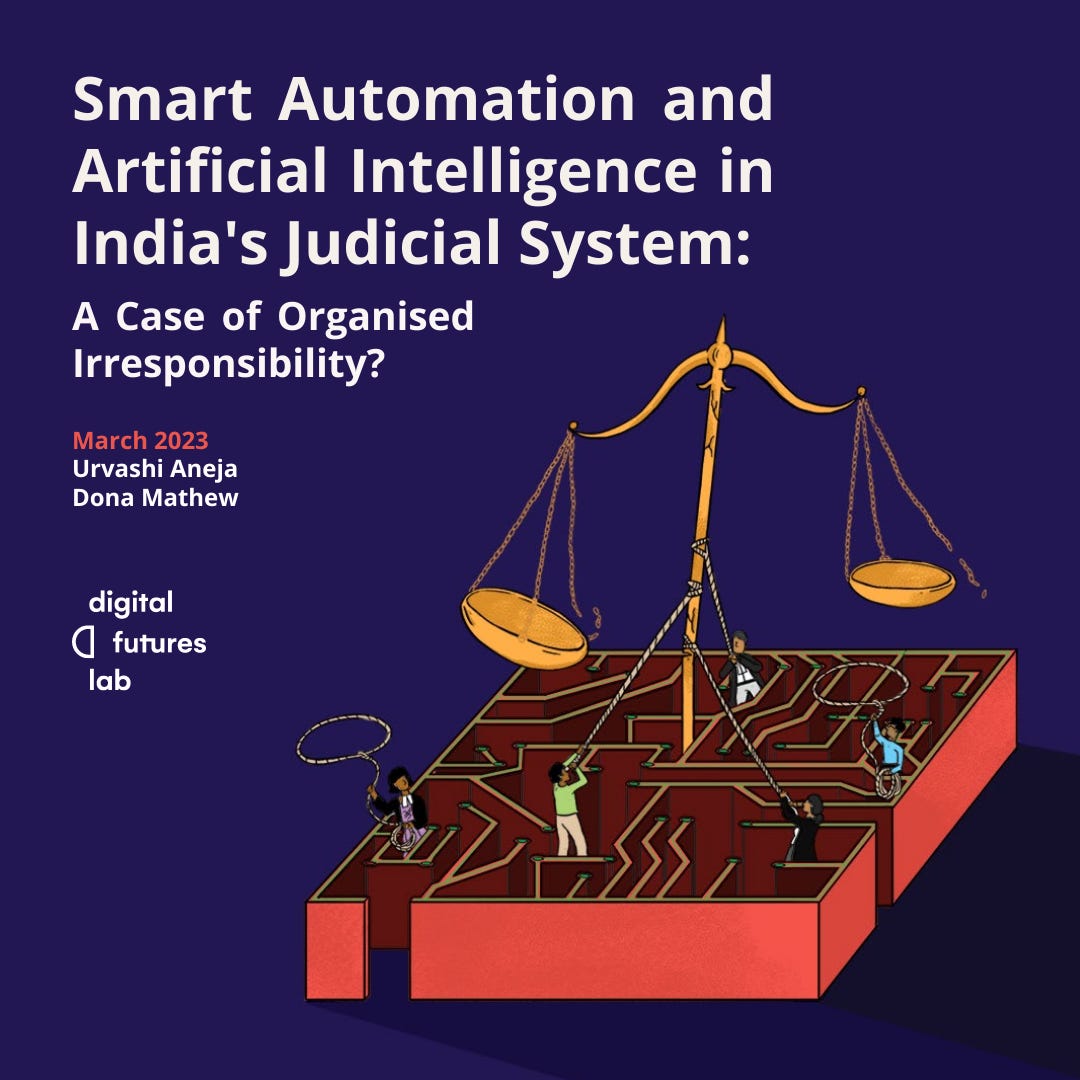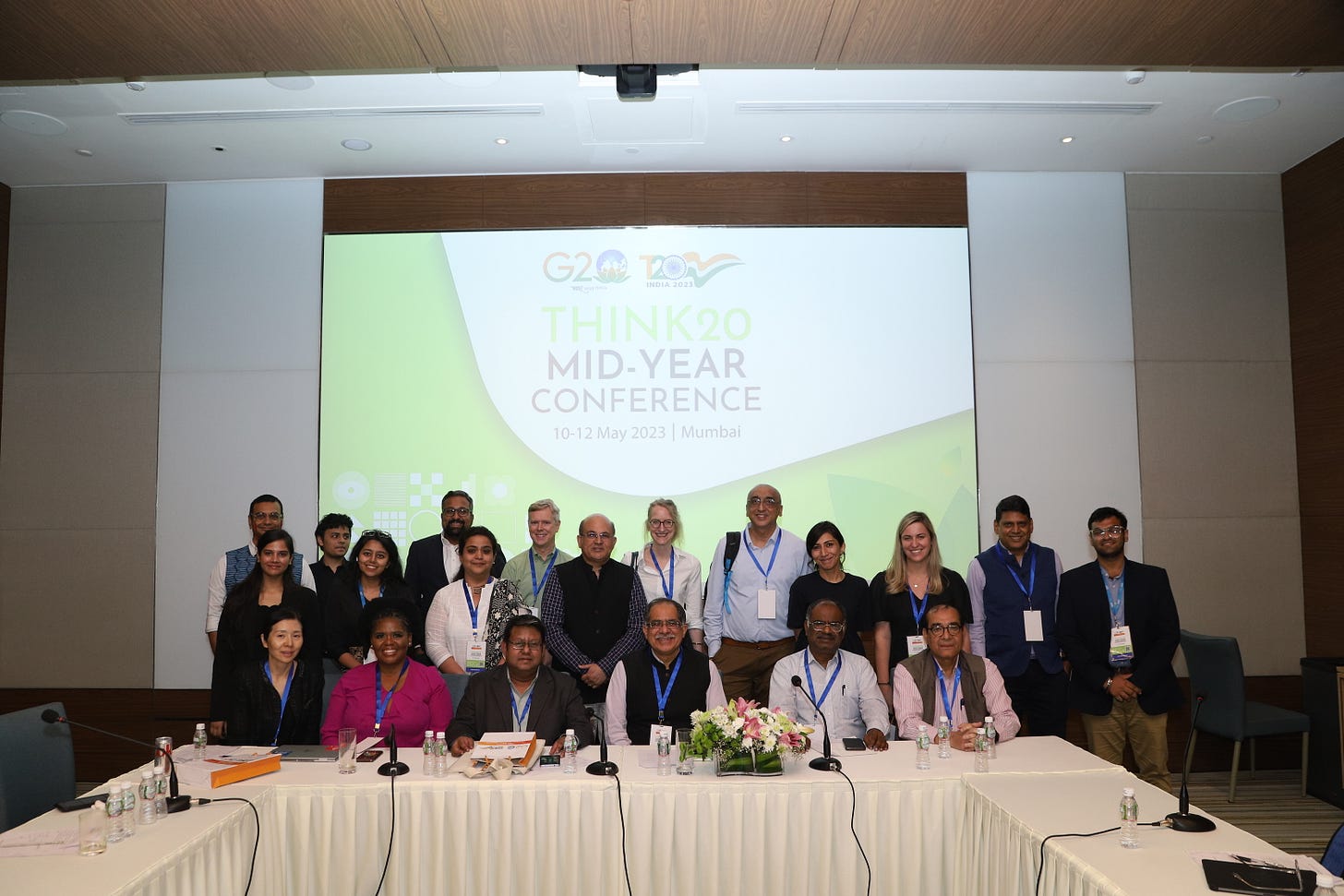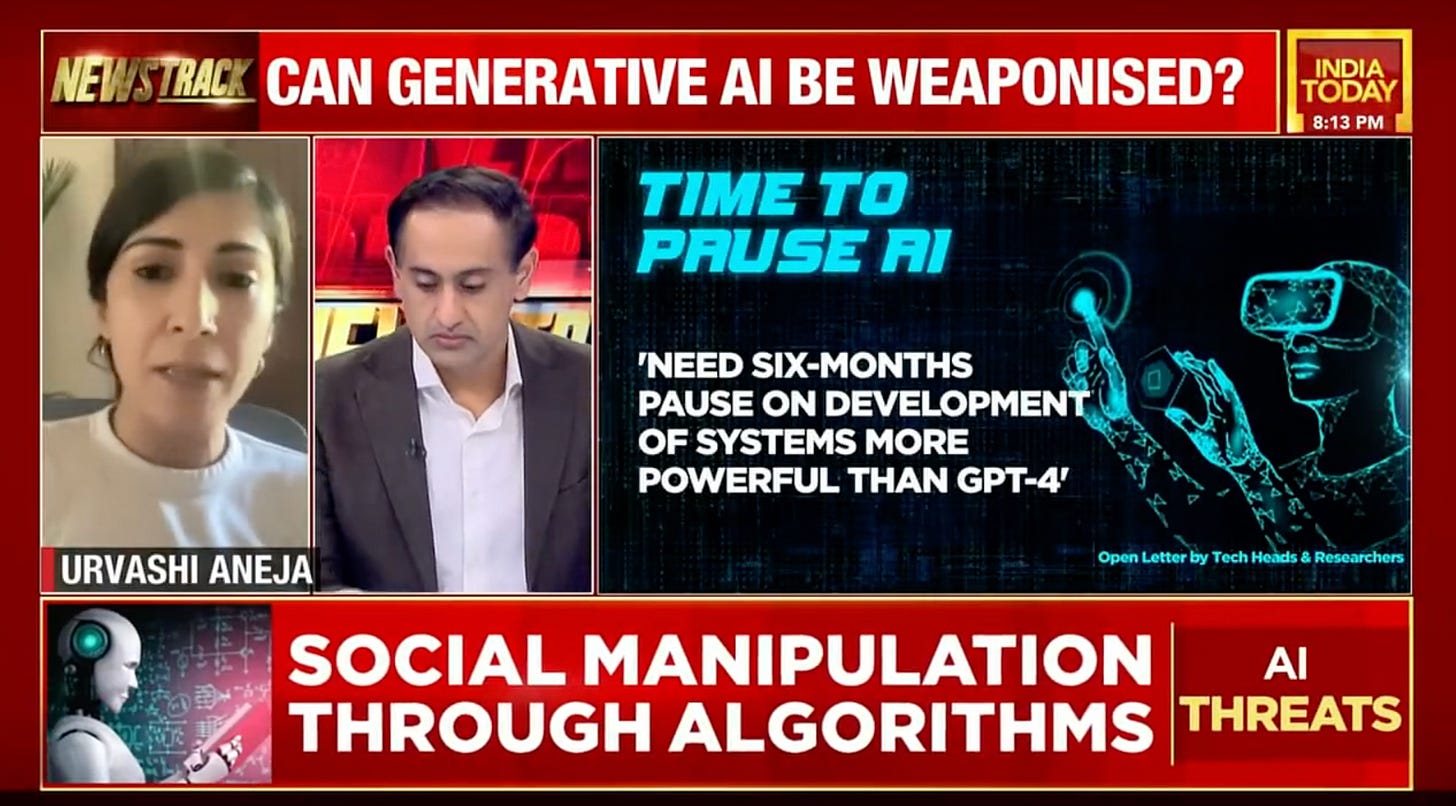Digital Futures Lab/Issue #10: Algorithms, Justice and Accountable AI
We’re almost halfway through the year, and what whirlwinds April and May have been! 💨 💨
Digital Futures Lab published an extensive, year-long research report on AI in the Indian judiciary, got invited to RightsCon Costa Rica, and is slowly working towards a working group on Generative AI. 🇨🇷 ⚖️ 🤝
Read more about it below! 👇🏽
And to think we (only) have the rest of the year to go! 😮💨
research 📑
It's finally here! 🎉
Digital Future Lab’s Urvashi Aneja and Dona Mathew spent the past year combing through the Indian legal system's growing relationship with AI and smart automation - and the actors that promote it. 🔍
’Smart Automation and Artificial Intelligence in India's Judicial System: A Case of Organised Irresponsibility? ' maps the landscape of actors and narratives that have been propelling the incorporation and development of AI for the Indian court system. ⚖️ 🤹🏼
They argue that the current scattered approach to smart automation of the judicial system, without due deliberation and legislative processes, increases the risks of harms - without means to trace accountability. 🫢
Learn how having many actors attempt to “fix” a problem in a myriad of ways results in greater risk than resolution in our latest report.
Translating rules and decision-making procedures into algorithms grants them a new kind of permanency, which creates an additional barrier to legal evolution.
This poses a risk of legal stagnation and a loss of judicial legitimacy.
Digital Futures Lab convened the first workshop for the AI and Climate Action in Asia expert network, supported by the Rockefeller Foundation. ⛈ 🌏
Experts shared perspectives on the ways in which AI innovation trajectories are unfolding in their region - the meeting covered issues such as data access and quality, community rights and engagement, digital public infrastructure, and generative AI. 🤝 👩🏽💻 🤖 🌡
policy ⚖️
The T20 task force for Digital Public Infrastructure, for which Urvashi is co-chair, had its second in-person meeting in Bombay at the T20 mid-year conference. At the meeting, working group members finalised the communiqué on digital public infrastructure.
Urvashi was recently appointed to a committee, organised by India’s Ministry of Electronics and Information Technology, on the ‘Architecture/Design/Functionality of India’s Dataset Platform’.
media ✍🏽
’Smart Automation and Artificial Intelligence in India's Judicial System: A Case of Organised Irresponsibility? ' was referenced in articles from Reuters (via The Hindu) and The Signal. Both articles touched on the risks of incorporating AI in the Indian court system.
Urvashi was brought on as a guest on India Today's Newstrack segment with Rahul Kanwal, where she spoke about the need for greater transparency around the data being collected and curated to create AI tools and systems.
events 🎤
We hosted the 7th Tech and Society Dialogues session this month, on artificial intelligence in Indian courts, to launch our report on automation and AI in the Indian court system. We were honoured to host a stellar panel comprising Jhalak Kakkar (CCG, NLU Delhi), Advocate N. S. Napinnai (Lawyer, Cyber Saathi), Prateek Sibal (UNESCO), Dr. Sudhir Krishnaswamy (NLSIU, Bengaluru and Oversight Board) and Usha Ramanathan (independent law researcher).
Catch the recording and read a summary of the event here.
Communications and Public Engagement Manager, Sasha John, sat down with CIS India’s Pranav Bidare, MediaNama’s Aarathi Ganesan and IIT Bombay’s Anupam Guha about the social, structural and future impacts of Generative AI at BeFantastic’s AI + Art festival in Bangalore.
Read a summary of the event here.
knowledge exchange 🧠
Urvashi was recently invited to join the Community of Practice (CoP) on AI systems as digital public goods (DPG) as an expert participant, by the Digital Public Goods Alliance (DPGA) and UNICEF. The AI CoP will explore how to harness AI solutions as digital public goods responsibly and evolve the DPG Standard to meet the needs of AI.
Cambridge University’s Dr. Maya Indira Ganesh, along with DFL’s Urvashi and Sasha John, organised a working group on generative AI and its impact on the global south. The group is still a Work-In-Progress, but the objective is to create space for a nuanced and collective response to the current moment in AI development.
what we’re reading 📖
Sasha
📕 Trends in digital personalised learning in middle to low-income countries by UNICEF
Dona
🎧 A Data-Informed Approach to Climate Justice: Exploring the Intersection Between Climate Change and Humans by Relational Insights Data Lab
Arjita
📕 “How Dare They Peep into My Private Life?” by Human Rights Watch
🎧 Platform Predicament - Making Sense of a Datafied Future of Work by IT for Change
community ask ❓
We’re interested in expanding our discussion group on Generative AI. We’d like to speak to researchers, academics, professionals, creative folks etc. who have a nuanced view of Generative AI and the structural social changes it could enable, preferably with a focus on the Global South.
Think you or someone you know would be a fit for either of these requests? Respond to this newsletter or email our Comms & Public Engagement Manager at sasha@digitalfutureslab.in.
coming up ⏭
Urvashi will be speaking at the opening ceremony of RightsCon Costa Rica taking place June 5th - 8th 2023. Additionally, Research Associate Aman Nair will be co-chairing a session on platform cooperatives with Cooperative UK at RightsCon Costa Rica on June 6th at 12:45 PM (IST) / 2:15 AM (CST).
We have our next Tech and Society Dialogue session on June 15th. This time, we’re talking about the data annotation industry! Register here.
Stay tuned for details!
Have an idea for creative collaboration, a future Tech and Society Dialogues event or a research partnership? Reach out to our Comms & Public Engagement Manager, Sasha John, at sasha@digitalfutureslab.in or @SashaEmJay on Twitter.
Follow Digital Futures Lab on Twitter, LinkedIn & Instagram!



